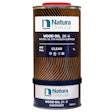Tiny batteries-1,000 times thinner than a piece of paper-made from tin-coated slivers of wood could offer a long-lasting, efficient, environmentally friendly energy source, according to an article from EurekAlert!, an online news service operated by the American Association for the Advancement of Science.
Liangbing Hu, Teng Li and colleagues from the University of Maryland NanoCenter have replaced a typical battery's inflexible substrates, which cannot handle the stress of flowing ions, with wood fibers, which are naturally designed to hold electrolytes. The additional use of sodium ions rather than lithium would make the batteries more environmentally friendly.
The team members reported the batteries performed successfully through 400 charge-discharge cycles, making them one of the longest lasting sodium-ion nanobatteries. The tiny batteries, the researchers say, would be best suited to large-scale storage applications like wind farms or solar energy installations.























